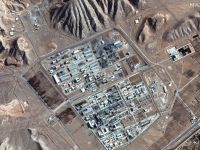By Munir K. Nasser
London
A leading Middle East analyst in England called on the Palestinians not to stick to their “red lines” on the core issues of Jerusalem and the refugees because “it is purely a rhetorical position.”
Yazid Sayegh, a professor at Cambridge University and consultant with the International Institute for Strategic Studies in London, told Albawaba.com in an interview that when the Palestinians “insist on these holy principles, they are being dishonest”.
Sayegh noted that the Palestinians are holding onto red lines that after all were created artificially.
“The real question, I think, is whether the Palestinians gain meaningful control over their land and their lives, or whether they gain real and meaningful presence that they are entitled to in Jerusalem,” he argued.
The following are excerpts from the interview:
Q- The news from Camp David said the Palestinians have agreed to the concept of “shared sovereignty” in Jerusalem. What is your understanding of this term?
A- It depends on what details come with it. Shared sovereignty can mean that two parties share sovereignty in different parts of the city. It could mean that they both claim sovereignty over the same area under some understanding whereby one side laws would apply to one community, for instance Israeli citizens, where another group’s laws would apply to its community.
Q- Would the Palestinians accept the concept of shared sovereignty in Jerusalem with Israel?
A- What has been suggested for some times has been functional authority over Arab neighborhoods of east Jerusalem, with or without the Old City, and this would be under overall Israeli sovereignty. In the past, some Israelis argued that if the Palestinians run their own affairs and applied their laws, and use their laws to enforce their courts and their police, land and residency, and all the things that are determined by Palestinian authorities, then what is left is the sovereignty that they don’t have. So this has been an Israeli argument and may be the Palestinians have gone along with that. Alternatively, they may have agreed they can’t agree to a final deal on Jerusalem, but what they can do is to agree to interim situation in which the Palestinians gained sufficient control over real functional things like strategic planning for the city and housing and so on, where they can guarantee the Israelis will not use the transitional period to create new facts on the ground. So it could be any of these, I don’t know.
Q- Arafat is under much pressure not to give concessions on Jerusalem and the refugee issues. Do you think he can hold his ground?
A- Certainly, he is under more pressure to hold his ground. He has political reasons of his own. I personally think the Palestinians can get a fair deal on most of these issues, including Jerusalem, but it may take more time. The main point is, however, that some Palestinians insist on holding to the red lines, while missing the main issue. Frankly speaking, I believe it is merely a rhetorical position.
Q- Can Arafat afford to cross the Palestinian red lines?
A- At the end of the day, they are holding onto red lines that, after all, were created artificially through war or by Israel; they themselves have rejected these lines before. How come these things have come holy and sacrosanct? Why is the 1967 line more sacrosanct than other lines? The real question, I think, is whether the Palestinians gain meaningful control over their land and their lives, whether they gain real and meaningful presence that they are entitled to in Jerusalem so that they have just as much right the Israelis have. And if this means redrawing the boundary, then the important principle is not the sacredness of these 1967 boundaries; the important thing is that the changes to the boundaries are minimal and reciprocal. That is, the Palestinians can get an equally significant type of land in return for what the Israelis take. People may say this would break some principles; is reclaiming other bits of land not a principle?
Q- Israel is talking about annexing the settlements around Jerusalem in exchange for some land near Gaza or the Negev. Do you think the Palestinians would accept that?
A- It is a matter of what is realistically possible to do in real life and politics. If the Palestinians want a deal, they have to calculate for themselves what is the minimum acceptable offer.
Q- For Arafat, Isn’t sticking to the red lines on Jerusalem and the refugees important for his political survival?
A- Sticking to a position that you know will go nowhere is dishonest, because you might as well come out and say you want everything to fail, you don’t want an agreement, you don’t want a deal of any type with Israel, and you want to carry on with a war. Therefore, when they insist on these holy principles, they are being dishonest.
Why should this 1967 line be more holy than getting land that was lost in 1948 near Gaza?
Q- Is Barak being genuinely flexible on what he offers to the Palestinians?
A- I think what he offers he can’t withdraw, so whatever he is suggesting he is obviously willing to give. However, he wants a certain price in return, and it is for the Palestinians to decide whether what they get is good enough, and whether what they give in return is too high.
Q- How do you see the Palestinian position on accepting Israeli sovereignty over Jewish settlements in the Jerusalem area?
A- My view is that the issue related to the Jerusalem area is a very difficult one and there are problems that will rise ahead, such as what to do with Maale Adumim. Is it to connect the settlement to Jerusalem or to make it an enclave through a tunnel or something? I think the Palestinian position is one where is there is a certain minimum of real red lines in Jerusalem. But, I believe, these red lines should not involve refusing compromise arrangements on the Old City, and demanding the removal of 200,000 Jewish settlers from the area. I think the solution is one where you can say that not every settlement created since 1967 can stay: certain settlements or parts of them will have to be removed. There will be some redrawing of the map if people want to hammer a deal. But do they get in return a real city? I think that is something worth fighting for. However, it should be a real city which the Palestinians can get a real hold of, a real place that can grow in the future into a real city and not just a series of tiny little pockets – Albawaba.com
© 2000 Al Bawaba (www.albawaba.com)







